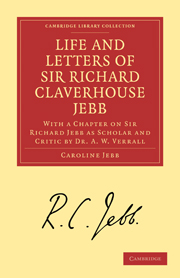 Life and Letters of Sir Richard Claverhouse Jebb, O. M., Litt. D.
Life and Letters of Sir Richard Claverhouse Jebb, O. M., Litt. D. Published online by Cambridge University Press: 07 September 2010
In April, 1894, Mr Asquith introduced a Bill “to terminate the establishment of the Church of England in Wales and Monmouthshire, and to make provision in respect of the temporalities thereof.” The debate in the House upon this Bill was long and earnest. The speech Jebb made in defence of the establishment is so characteristic of his style of speaking;—it also explains the situation so clearly, that perhaps my readers will forgive me if I include it here.
“In asking the indulgence of the House for a few minutes only, my aim is less to criticise details than to consider certain large aspects of the question which this Bill brings before us. Vital as the measure is to the highest interests of Wales,—far-reaching as must be its ulterior consequences, should it pass into law, for the Principality,—it is not of less import, and its consequences will not be less extensive or less serious, for England as a whole. It is not merely the first step towards the disestablishment and disendowment of the Church of England, but actually the first instalment of such a measure. Every member of the Church of England is therefore entitled to participate in this discussion, even although (as is my own case) he is ignorant of the Welsh language, and has no such knowledge of Wales as may be acquired by residence. The principle affirmed as justifying the introduction of the Bill has been stated with the utmost frankness and clearness by the Home Secretary. It is simply that at the last general election Wales sent to this House a large majority of members in favour of such a Bill. […]
To save this book to your Kindle, first ensure [email protected] is added to your Approved Personal Document E-mail List under your Personal Document Settings on the Manage Your Content and Devices page of your Amazon account. Then enter the ‘name’ part of your Kindle email address below. Find out more about saving to your Kindle.
Note you can select to save to either the @free.kindle.com or @kindle.com variations. ‘@free.kindle.com’ emails are free but can only be saved to your device when it is connected to wi-fi. ‘@kindle.com’ emails can be delivered even when you are not connected to wi-fi, but note that service fees apply.
Find out more about the Kindle Personal Document Service.
To save content items to your account, please confirm that you agree to abide by our usage policies. If this is the first time you use this feature, you will be asked to authorise Cambridge Core to connect with your account. Find out more about saving content to Dropbox.
To save content items to your account, please confirm that you agree to abide by our usage policies. If this is the first time you use this feature, you will be asked to authorise Cambridge Core to connect with your account. Find out more about saving content to Google Drive.